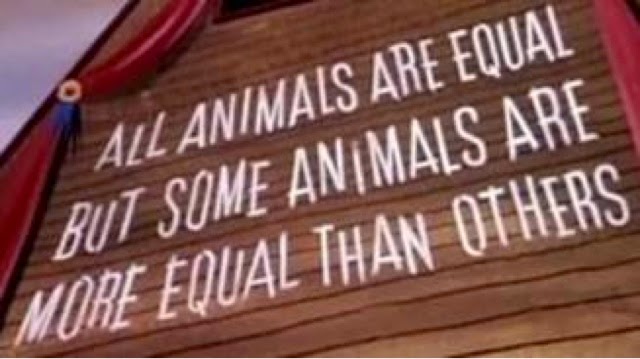Late last week, we started Activity 2 of Unit 3 which had students explore the short story Harrison Bergeron by Kurt Vonnegut. We also looked at a short film version of the text which can be watched on YouTube at http://youtu.be/-4-hEfqpxIg
After exploring this text, in the following lesson, students were required to write a blog post reflecting on our current political and social environment and to philosophise upon the concepts of equality, handicap and intelligence that are explored in the text. Is it a warning? Can we truly be equal? What does equality look like?
The blog posts were to be approximately 600 words in length and to be posted on our class Edmodo page. Students were then also encouraged to pass comment on other people's responses as a form of formative feedback. Many students initially struggled, as many were not use to the idea of 'thinking for themselves' or with the concept of 'there's no real right or wrong answer.' So in order to put my money where my mouth is, I volunteered to complete the task also.
However, there were conditions. I wasn't allowed to post my completed blog post on the Edmodo page in entirety (as they didn't want to have to compare my post to there's) and I had to submit my work by the same deadline.
So, to my delightful Year 10 students (and any other's who may be following my blog in the wider education community) here is my homework...
Reflection on Kurt Vonnegut's Harrison Bergeron
The year is 2014...and everyone is finally equal. Well, in order for that statement to be true, we would have to have a shared understanding of what equality is. So, what is equality? What does it look like? Is it something that can actually be attained, or is it some mythical creature like Big Foot which everyone swears is out there, but somehow we have no real evidence of seeing?
I think the theoretical notion of equality in itself is problematic. In order to define it, everyone needs to be on the same page as to what that definition is. But who decides what the standards are? And who decides who makes the decision? Is the definition of equality universal or is the definition subjected to variation between different cultures and societies?
When using the word equality, I think most people would define it as all individual having the same opportunities and treatment within society; or the same status. But when trying to establish equality, a set of benchmarks need to be made. It is from these benchmarks that a person can be valued as either being privileged or underprivileged in a particular area of there being. So for example a person who has no home or job is not being seen as equal to a person with a home or job. However, our society has determined that the desirable outcome is the latter as opposed to the former. The person without the job or home is classified as underprivileged in our society, as we value these two possessions. When a person is seen to be underprivileged, we typically offer support in order for this person to be 'equal'.
This is where I go back to how equality is problematic. How equality is distributed seems to be directly influenced by what society values. Or more precisely, what the people in power in our society value. If those in power value the marriage of man and woman, then they would allow the opportunity for all men and women to marry. However, this does not demonstrate those in power valuing marriage as a whole, as they are not giving same sex marriages the same level of value or equality as heterosexual marriage.
When reading Harrison Bergeron, I kept thinking of Orwell's Animal Farm, and the commandments of the pigs. Those in power create a set of rules in order for all animals to be 'equal', but they then kept amending the rules to benefit some over others. In the end it can be summarised by this image:
In Harrison Bergeron, they had the 'Handicap General'; a person who had ultimate power to oversee and ensure that society was 'equal'. By but empowering an individual to do this, in itself creates inequality.
The year is 2014, but we aren't equal. And who's to say that equality would be better in the long run? To truly create equality it would mean that some individuals would be better that current circumstance, but then others, in theory, would be worse off. I the short story, Vonnegut depicts how those who are 'better' are handicapped and impaired to try and make them more equal to those who are disadvantaged. Here he shows how intellect and knowledge is seen as dangerous, and those who possess these qualities could shift the balance of power.
Harrison Bergeron demonstrates how equality doesn't demonstrate justice, and how sometimes in the attempt of creating an equal world it could be detrimental to society. And through Vonnegut's story, we can gain an understanding of just how subjective the concept of equality actually is.
What are your thoughts? Can we ever be truly equal? How would you define equality?
